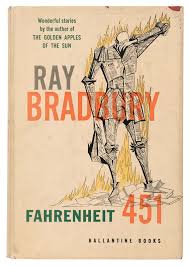
Fahrenheit 451 focuses on Guy Montag, who is a “fireman”. His job, in this dystopia of a world, is to start fires, not to put them out. He and the other firemen get calls that direct them to the houses they are supposed to go burn down.
Why choose those particular houses? The houses the “firemen” are sent to belong to people who have gathered up and hidden away a very dangerous substance that the government does not want the general population to be infected with. The substance in question is books.
All books are banned and destroyed. People found with books are also destroyed, often by the fireman at the scene of the crime.
Bradbury has created a world that is my personal version of Hell itself.
This is a world set “in the future” where no one is allowed to read, or own, or even talk about, books. Instead, people sit in front of large screens and watch funny shows. They spend their waking (and sleeping) hours listening to music and random noises that they can hear through a small device that fits directly into their ears.
No one communicates with friends or family anymore, substituting instead the characters they watch on their big screens. Most people have no concept of historic events, and even less idea of what their government is doing right now. They are told about “the war” (which never seems to end) but, for the most part, are kept from hearing too much about it. Sound frighteningly familiar to anyone else?
Guy, of course, eventually becomes curious. What’s in these books that is supposed to be so terrible? Almost subconsciously, he takes one book away with him from a fire. Eventually, he’s got his own horde of books to be worried about. Will his wife find them? Will she turn him in? What will happen to him if he’s caught?
Guy begins reading some of the books. The result is that Guy not only begins to think for himself but also starts to believe that the government is wrong. He now believes that people should read books. His choices after this epiphany lead to an exciting chase through the rest of the story.
There is something interesting about the title that I think some people might not realize at first glance. Fahrenheit 451 is the exact temperature at which paper begins to burn.
Why does this book get banned? It seems to be because there are people who wish to keep other people from reading a book that is not only about governmental censorship, but also about actually burning books that are deemed to be questionable or dangerous. Are they even capable of seeing the irony?
Some parent’s feel that Fahrenheit 451 should not be part of a school’s curriculum because it contains swear words. The Banned Books Week website has the following information:
Rather than ban the book about book-banning outright, Venado Middle school in Irvine, CA utilized an expurgated version of the text in which all the “hells” and “dams” were blacked out. Other complaints have said the book went against objectors religious beliefs.
The Beyond the Stacks website has the following information:
The 1971 reprint of Fahrenheit 451 by Bal-Hi was accidentally switched with a redacted version that had been “sanitized” for use in public schools. The editors cut out or altered “offensive” phrases, mostly mild swearing or passing references to sex. In the 1970s, the only new edition of Fahrenheit 451 you could buy was a censored one. When Bradbury became aware of the censorship, he made sure that a new edition was reprinted with a “coda” at the end by the author. He also rescinded his initial approval of the redacted/abridged version.
With our nation of cell phone, ipods, and citizens who are more likely to vote for their choice of “American Idol” than for their choice of American President, this book has never been more relevant! Read it to see just how far we could fall, if no one decides to stand up for books, and history, and ideas not sponsored and spoon-fed to us by the government.
Read this book because you agree that the ability to think for yourself, and the ability to act on those thoughts is important! Or, just read it because it happens to be a great story, that includes fires, destruction, and an epic chase through the countryside. This book shares important ideas, and those ideas should not be cast aside simply because a few unsavory words were included in the text.
This book review of Fahrenheit 451 – by Ray Bradbury is a post written by Jen Thorpe on Book of Jen and is not allowed to be copied to other sites.
If you enjoyed this blog post please consider supporting me on Ko-fi. Thank you!
